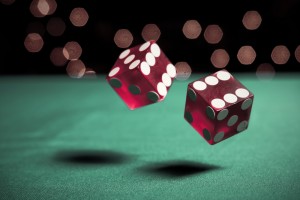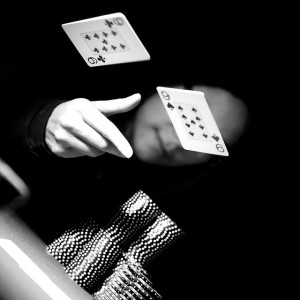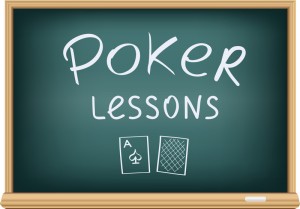I have spent a lot of time in these columns talking about bad beats, downswings and tilt, which are all related to luck, but sometimes it pays to take a step back and look at the more fundamental question. What exactly constitutes luck in poker?
The first thing to realise is that luck in poker is more or less zero-sum. Any money that you win at poker comes from the other players in the game. Therefore any piece of good luck you experience directly corresponds to bad luck experienced by your opponents either singly or collectively. Likewise any piece of bad luck you experience is reflected in good luck for your opponent. It’s not quite a perfect model, because all the time we have the rake chipping away at our stacks, acting as a leech on the ‘good luck pool’. But for practical purposes we can consider luck to be zero sum. If somebody’s gutshot hits, somebody’s top pair, or other winning hand, got drawn out on. If player A is getting no good cards, then players B, C, D, E, F, G, H, I and J are collectively winning more than their fair share of pots, with hands that might otherwise have lost.
The logical conclusion is that in any given period about 50% of players are going to experience more than their share of good luck (be lucky), while the other 50% will experience less than their share (be unlucky). What’s more, over the long term nearly all players will experience luck that approaches ‘average’. Lots of individual pieces of good luck and bad luck, but overall they will largely cancel each other out. Interestingly though, you will rarely find a poker player who considers himself lucky, but you will find hundreds that will swear they are the most unlucky player in the world. This is usually attributed to two factors:
1. Most poker players consider themselves better players than they actually are. When your results don’t match up to your lofty expectations, it is easier on the ego to consider yourself unlucky than to admit that you are not as good as you think you are.
2. Poker players tend to have a selective memory when it comes to luck. They will remember the times they took a bad beat, but conveniently forget about the times they put a bad beat on somebody else.
These factors are indeed big contributors to the ‘poor me’ attitude among players. But there is something more, something fundamental that a lot of players just don’t understand, or at least overlook. Consider the following 4 hands:
Hand 1
You are playing limit hold’em and hold AK. In a 3-way pot you hit a flop of AJ8. You bet all three streets and are called down by both players (one folded the river). Your hand is good and you win a nice pot.
Hand 2
Early in a tournament you pick up 98s on the button and call a small raise from a good player in middle position. The flop is A76. You call a pot-sized bet on the flop, then raise the turn after another pot-sized bet when a T hits. Your opponent thinks for while, then folds.
Hand 3
You are in a no-limit cash game and you raise AA in middle position. The small blind comes over the top of you and you push. He calls and shows KK. Your hand holds up and you win the pot.
Hand 4
You are in the middle of a tournament. The blinds are 200/400 and a tight player under the gun raises all in with his last 5000. It is folded to you in the big blind and you call with AQ. He flips over AJ and your hand holds up.
Did you ‘get lucky’ in the above hands? Most players tend not to think so. In each case you either got your money in with the best hand, or called with a legitimate draw and good pot/implied odds. But let’s look a bit more carefully at the hands.
In the first hand, it is not stated what your opponents held, but let’s assume they both had some kind of hand. Say one held KJ (middle pair) and the other T9 (a straight draw). In this situation you are only slightly better than 50% to have the best hand by showdown. The fact that you won the pot could almost be considered a lucky escape.
In the second hand, you called with a speculative hand and hit, but most of the time you are going to miss with these hands. Again, we don’t know what hand your opponent held, but it is almost certain to be better than 9 high. He may well have had a big pair or big ace. You needed quite a bit of help from the board and you got it. Pretty lucky in fact.
In the third hand your opponent hit a major cooler. When you hold AA, one of the greatest things you can wish for is one of your opponents holding KK, but it will only actually happen very rarely. Sure, you got your money in as a huge favourite, but this was not down to any great play on your part, or weak play by your opponent, but blind luck. If the positions were reversed, you would have been in the exact the same pickle.
In the last hand, you again got your money in with the best hand and won. But here you got lucky in a different way. A tight player going all-in under the gun is usually going to have a good hand, probably something like 88+, AJ+ and KQs. You called and luckily stumbled into the only hand in his range that you are a strong favourite against. In fact, you are an underdog against his range and your call is marginal at best.
In all the hands you were lucky. If it helps, look at each hand from the point of view of the opponent and consider what you would have been thinking if the roles were reversed. If you assume that the opponent in hand 2 had a big ace or over pair and the opponents in hand 1 had a legitimate hand or draw, you would likely feel at least a little unlucky. It is easy to see how the ‘luck symmetry’ is broken. In these four hands the losers will feel unlucky, but the winners will not feel lucky.
And remember, these are just four examples. There are a million scenarios in poker where the turn of a card or distribution of hands allows a player to win more money or lose less. Your opponent hitting his flush draw when you already have a full house. An ace flopping, allowing you to fold your KK, when one of your opponents already had AA. A dominated hand that you folded preflop because a third player in front of you raised. The extra big bet that went in preflop from the player who quietly folded the flop when he missed. There are hundreds of examples, because luck is a factor in poker at every turn. Where do you draw the line and say what is ‘lucky’?
There is no right and wrong here. Luck is an integral part of poker and it is difficult to start drawing lines to say what should be considered lucky and what shouldn’t. Nor is it really important, because the influence of luck in poker is not going to change, regardless of how much you complain about it. The point is that most poker players have a huge double standard. They will consider themselves unlucky when a certain situation occurs, but refuse to acknowledge their good luck when the roles are reversed. This leads to a feeling that they are unlucky overall and fosters the persecution complex described earlier.
Even More Luck
The hands above illustrate some ‘hidden luck’ that many players do not acknowledge. But we can take it even further. We usually consider ‘getting lucky’ as either something unlikely happening in your favour and/or a piece of bad play yielding a good result. But really, any hand in which you win more that you could expect when the money goes in is lucky. Let’s look at an extreme example. You manage to get all in Preflop with AA against an opponent who for some reason wanted to play with 72o. You have 88% equity in this situation.
If you ran this hand hundreds of times, most of the time you will win the whole pot and sometimes you will win nothing (plus the occasional split pot). On average, you will win 88% of the pot. So really, if you win the pot you are lucky because you won 100% of the pot compared to the 88% of the pot you could expect. Likewise your opponent, even though they played incredibly stupidly, is unlucky because they could expect to win 12% of the pot, but they won nothing.
How many times have you stopped to consider yourself lucky because your aces have not been cracked in a heads-up pot? My guess is not many.
This kind of thinking can be extrapolated even further. When you think about luck in the broader sense, the only thing that really matter is how much money you win. If you expect to win 1 big bet per 100 hands in the long term, then if you play a 500-hand session and win 10 big bets (2BB/100) then you got lucky, unless you played so much better than usual that you actually raised your expectation that much (extremely unlikely). Likewise if you only win 2 big bets in the session, then you got unlucky, providing you were playing as well as usual.
And we can look at this on a more micro level too. If you again win 1 big bet per 100 hands, then that equates to 0.01 big bets per hand. Obviously every pot you win will be bigger than that, because more money that that will be paid by the blinds. So really, every pot you win is essentially lucky. It doesn’t matter how you won it or how big the pot was, if you won it you got lucky, because skill alone could never guarantee that you won that pot. You could use similar reasoning to conclude that every pot you don’t win is unlucky, even those where you fold pre-flop.
In every single pot you will get either lucky or unlucky in some regard.
Conclusion
When you distil the idea of luck down to its bare bones, you realise how absurd the complaints of most poker players about their bad luck actually are. It’s not that luck isn’t a factor in dictating your results. On the contrary, it’s such a large factor, and it permeates so many levels, that to isolate and complain about any individual bad card or cooler is ridiculous. In any given session, your results are influenced by literally thousands of little pieces of luck.
There is no such thing as ‘justice’ no such thing as a pot you ‘deserve to win’ or indeed lose. The only real indicator of whether you are getting lucky or unlucky is whether you are earning more or less than your expected win rate. And even that can easily be misleading, because your long-term win rate constantly changes according to how good the game is and how well you are playing. In fact, maybe the best thing to do is not worry at all about luck and just concentrate on making good decisions.
Of course, most of you will recognise that this conclusion is hardly original.
Submit your review | |
So then whats the point in playing this game if everything is about luck. If you are lucky in 10 hands where the pot is arount 5k and you loose one for 200k ? Are you a lucky player? Because you won 10 and you lost one???
How about when you start a cash game with 100 blinds and you win all night(50 hands) and you loose 3 important pots, and loose everything, post flop, when your oponents are on a draw. Are you a lucky or unlucky player? You shouldnt play the big pots? Isnt poker all this about, big pots? Isnt this the reason why you play, to get there?






